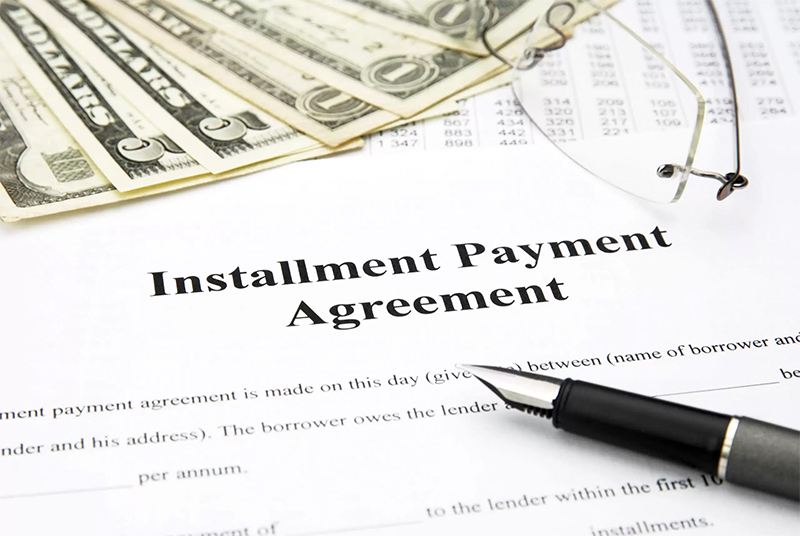Are you looking to eliminate Internal Revenue Service (IRS) debt? Here are some possible solutions.
Installment Agreements
An installment agreement can be a great solution for individuals and businesses who are unable to pay their tax debt all at once. It provides a structured way to pay off what you owe over time, making it easier to manage your finances and avoid additional penalties and interest.
To set up an installment agreement, you’ll need to submit an application to the IRS. The application will require detailed information about your financial situation, including your monthly income and expenses. The IRS will then review your application and determine if you qualify for an installment agreement.
If approved, the IRS will work with you to determine a monthly payment amount that fits within your budget. Be honest and accurate when providing your financial information, as the IRS will use this to calculate the monthly payment.
There may be fees associated with setting up an installment agreement, and interest will continue to accrue on the unpaid balance. Entering into an installment agreement can help you avoid more drastic collection actions, such as liens or levies on your property.

Offer in Compromise
The OIC program is designed for taxpayers who are unable to pay their full tax liability, either due to financial hardship or other extenuating circumstances. Through this program, you can negotiate with the IRS to settle your debt for an amount that is less than what you owe. This can provide significant relief for individuals who are struggling to keep up with their tax payments. [1]
In order to qualify for an OIC, you must meet certain eligibility requirements set by the IRS. This includes filing all required tax returns, making all required estimated tax payments for the current year, and being current with your tax obligations. You must demonstrate that you are unable to pay the full amount of your tax debt, either through a lump sum payment or through a payment plan.
The IRS does not accept all OIC applications, and they will only approve offers that they believe represent the maximum amount that can be collected within a reasonable period of time.
If your OIC application is accepted, you will be required to adhere to certain terms and conditions set by the IRS, such as making timely payments and staying in compliance with your tax obligations for a specified period of time. Once you have fulfilled these requirements, the remaining tax debt will be considered settled.
File for Bankruptcy
There are different types of bankruptcy and each has implications for tax debt.
Chapter 7 bankruptcy, also known as liquidation bankruptcy, can potentially discharge your IRS debt if it meets specific criteria.
Chapter 13 bankruptcy, also known as reorganization bankruptcy, can provide a structured repayment plan for your IRS debt over a period of three to five years.
Consult with a qualified bankruptcy attorney who specializes in tax debt to explore your options and determine the best course of action for your specific financial situation.
Not all tax debts are dischargeable in bankruptcy. Recent tax debts (within the last three years), fraudulent tax debts, and tax debts related to unfiled tax returns are typically not eligible for discharge.

Currently Not Collectible
Currently Not Collectible (CNC) is a status that the IRS can grant to taxpayers who are experiencing financial hardship and are unable to pay their tax debt. When you are placed in CNC status, the IRS will temporarily stop all collection activities against you, including levies and wage garnishments.
To qualify for CNC status, you must demonstrate to the IRS that paying your tax debt would cause a significant financial hardship. This could include situations where your income is barely enough to cover your necessary living expenses or where you have significant medical or other expenses that leave you unable to make payments.
To apply for CNC status, you will need to provide detailed information about your financial situation, including your income, expenses, assets, and liabilities. The IRS will review this information to determine if you meet the criteria for CNC status.
If you are granted CNC status, it is only a temporary solution. While your collection activities are suspended, the IRS will continue to review your financial situation annually to determine if your status should continue. Any refunds you are owed will be applied to your tax debt.
CNC status does not make your tax debt go away. It simply provides temporary relief from collection activities while you work to improve your financial situation. If your financial situation improves, the IRS may remove you from CNC status and resume collection activities.
Penalty Abatement
One of the most effective ways to eliminate IRS debt is through penalty abatement. This approach involves requesting the removal of the penalties and interest that have been added to the original tax debt. Penalty abatement can significantly reduce the total amount owed to the IRS and make it more manageable for taxpayers to repay their debt.
To qualify for penalty abatement, taxpayers must demonstrate reasonable cause for their failure to pay or file their taxes on time. This can include situations such as a serious illness, natural disaster, or other unexpected circumstances that prevent the taxpayer from fulfilling their tax obligations. The IRS will consider each case individually and may grant penalty abatement if the taxpayer can provide evidence to support their claim of reasonable cause.
Penalty abatement does not eliminate the underlying tax debt, but it can significantly reduce the total amount owed by removing the added penalties and interest. This can make it easier for taxpayers to pay off their tax debt and avoid further financial strain.
Use 401(k)
There are potential consequences of using 401(k) funds to pay off IRS debt. Withdrawing funds from a 401(k) before the age of 59 ½ can result in a 10% early withdrawal penalty, in addition to regular income taxes. This means that a significant portion of the funds withdrawn will go towards penalties and taxes, rather than towards the debt itself.
One alternative to outright withdrawing funds from a 401(k) is to take out a 401(k) loan. This allows account holders to borrow up to 50% of their vested balance, up to a maximum of $50,000, and pay it back over a period of five years. While this option doesn’t result in penalties or taxes, if the loan isn’t repaid, the outstanding balance will be treated as a distribution, and taxes and penalties may apply.
Before deciding to use 401(k) funds to eliminate IRS debt, weigh the potential consequences and consider alternative options. Consulting with a financial advisor or tax professional can help in navigating the complexities of using retirement funds to address IRS debt.

Home Equity Loan
A home equity loan allows you to borrow money against the equity in your home. This can be a great option for paying off large debts, such as IRS debt, because it typically offers lower interest rates than other types of loans. This can save you money in the long run and help you get out of debt faster.
When you take out a home equity loan, you are using your home as collateral. This means that if you are unable to repay the loan, the lender has the right to seize your home. Because of this, make sure you can afford the loan payments before moving forward with this option.
In some cases, the interest on a home equity loan may be tax deductible, which can provide you with some relief when it comes to your IRS debt.

Are you burdened with IRS debt?
Contact Frego Law today to schedule a consultation and start your journey toward eliminating your IRS debt.
Source:
[1] Companies who promise to eliminate tax debt sometimes leave taxpayers high and dry | Internal Revenue Service. (n.d.). https://www.irs.gov/newsroom/companies-who-promise-to-eliminate-tax-debt-sometimes-leave-taxpayers-high-and-dry




